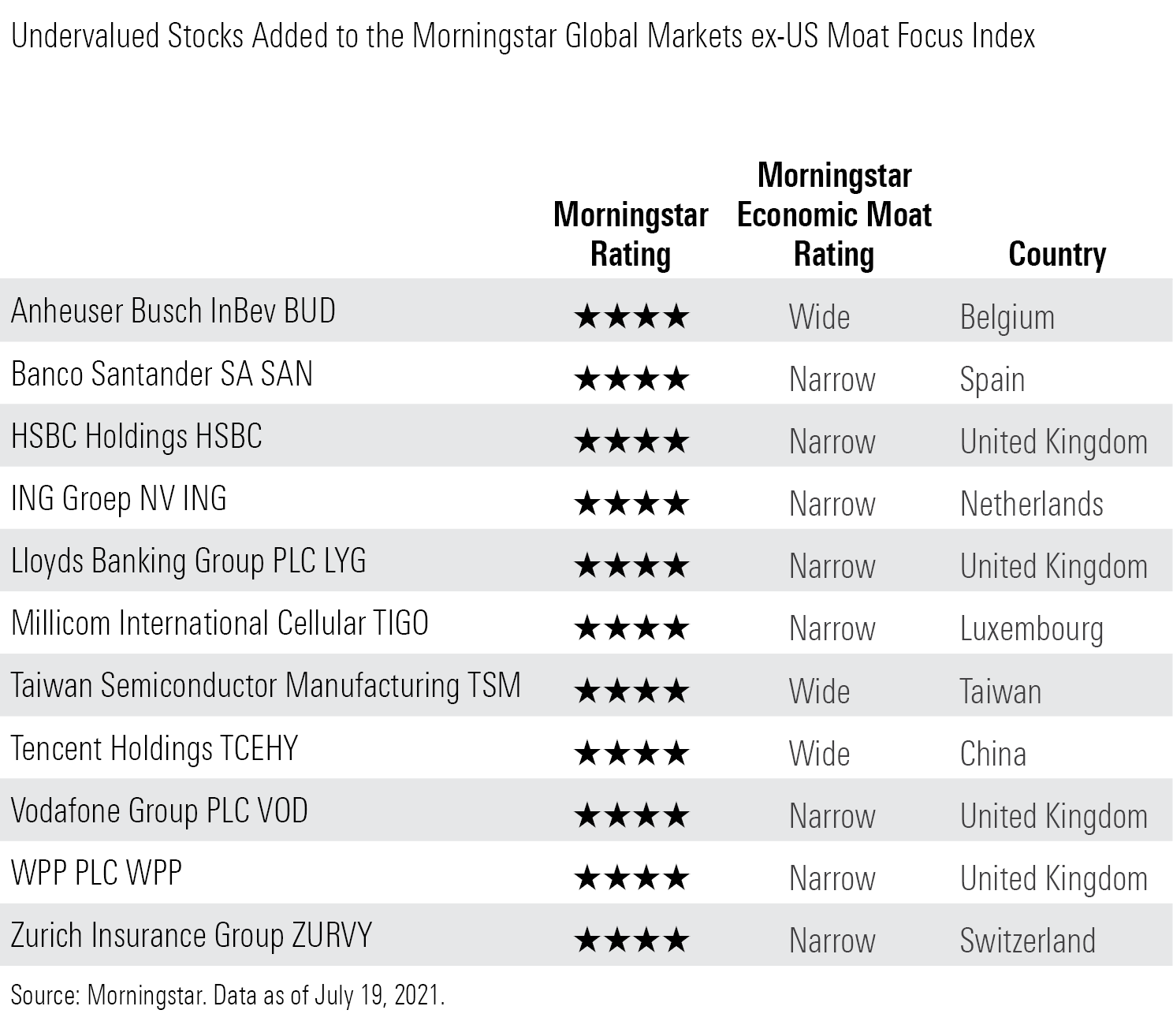
My colleague Ben Johnson has argued that investors have fewer reasons than ever for maintaining "home bias" in their portfolios. What's home bias? It's investors' tendency to tilt their portfolios in favor of domestic stocks versus foreign fare. He points out that U.S. stocks constitute about 55% of the world's public equity market cap, with foreign stocks representing the remaining 45%. But most investors' equity allocations are nowhere close to that breakdown.
"When it comes to investing overseas, many decide to ditch diversification at the border," Johnson notes.
Granted, there are good explanations for why this historically has been the case. Among them: Investing overseas can be costly; investors feel more "in-the-know" about companies that are domiciled in their home countries; the Canadian and U.S. market is less prone to corporate governance problems and political risk than some others; and domestic multinationals provide exposure to overseas markets. However, as the world becomes smaller, Johnson thinks some of these explanations have grown "flimsier" over time.
"Furthermore, in my opinion, even when considering them all together, they don't warrant the degree of home bias that exists in many investors' portfolios today," he asserts.
In a nod to going global, we're sharing some interesting--and inexpensive--foreign-stock ideas.
As a reminder, Morningstar's approach to smart stock investing applies around the globe. First, favour companies with durable competitive advantages, or economic moats. These companies should be able to fend off competition and outearn their costs of capital for years to come. Then, buy these companies when they're trading below what they're worth.
We've turned to the Morningstar Global Markets ex-US Moat Focus Index for opportunities. This quality-focused index is a subset of the Morningstar Global Markets ex-US Index, a broad index representing 97% of developed-markets (excluding the United States) and emerging-markets market capitalization. Morningstar ranks the wide- and narrow-moat stocks in the broad index by lowest price/fair value to find the 50 cheapest wide- and narrow-moat stocks. These stocks represent the most compelling values among the global moat universe, according to Morningstar analysts.
For this article, we focused on non-North American stocks that were added to the index as of its latest reconstitution in June 2021. Eleven of those newcomers have shares listed on U.S. exchanges (and are therefore easily accessible to Canadian investors), are covered by our analysts, and are undervalued as of this writing. Stamp your passport!

Here's a little bit from our analysts about three of the names on the list.
Banco Santander SA (SAN)
"Santander offers investors a combination of emerging-markets and developed-markets banking exposure. This will not be to everybody's taste. Santander points to its track record of lower earnings volatility as vindication of its geographical diversification strategy, while most fund managers will point out that they can use portfolio construction to achieve the same diversification benefits. We believe that Santander could boost its profitability, release capital, and rerate its valuation by trimming its portfolio to operate only in areas where it has a clear competitive advantage. Santander's U.S. regional banking business has been a particular drag on group profitability for the better part of a decade.
"The high-double-digit/low-20s returns on equity that Santander generates from its Latin American operations are obscured by the subscale returns it generates in Europe and the U.S. While profitability (and growth prospects) tend to be structurally higher in emerging markets as a rule, Santander is also one of the market leaders in Brazil, Mexico, and Chile. We believe Santander's strong competitive position in these consolidated markets protects its high profitability.
"Santander's earnings have been remarkably stable compared with most of its European peers. While diversification plays a role, its small investment banking exposure and relatively low exposure to home loans also contributed. Investment banking earnings tend to be volatile, while the long duration and low margins of home-loan books tend to lead to large write-downs relative to earnings during downturns in the credit cycle."
--Johann Scholtz, analyst
Vodafone (VOD)
"Vodafone has steadily transformed its business over the past several years, adding fixed-line assets in core markets, selling out of peripheral areas like New Zealand, and forming partnerships in others. The recent IPO of its tower business Vantage Towers marks the latest move to improve efficiency and highlight the value of underlying assets. Overall, we believe Vodafone holds a solid set of assets, with opportunities to grow cash flow.
"Through a series of acquisitions and partnerships, Vodafone has added fixed-line infrastructure to its traditional wireless business in several countries, notably in Germany, which is now its most important market, accounting for about one third of consolidated service revenue and 40% of EBITDA. Vodafone is now the largest cable company in the country, with networks that reach around 60% of the population, enabling it to capture about one third of the broadband market. In total, Vodafone can now provide fixed-line services in addition to wireless to about 140 million European homes, including 7 million in the Netherlands through its partnership with Liberty Global.
"Vodafone has also sought to improve efficiency and free up assets. The firm merged its Italian wireless towers with Telecom Italia's (INWIT), receiving EUR 2 billion in cash and a stake in the tower firm. Vodafone contributed its stake in INWIT, a U.K. tower venture, and the remainder of its owned towers across Europe to a new entity, Vantage Towers, which recently went public, freeing up additional capital for Vodafone. This should enable it invest aggressively while maintaining a solid financial position.
"Intense competition, especially in Spain and Italy, has led to disappointing financial results recently. However, we think the reshaping of Vodafone's capabilities across Europe to integrate fixed-line and wireless assets positions the firm to compete more effectively over the long term. Integrating fixed-line and wireless networks should improve the quality of each over time, while bundling services should enable the firm to serve customers more efficiently."
--Mike Hodel, director
WPP (WPP)
"WPP is the largest player within the advertising space, operating in more than 110 countries. We expect the firm to maintain its market-leading position as it generates competitive organic growth, continues to make acquisitions, and increases focus on the faster-growing emerging and the overall digital ad markets.
"We look for WPP's acquisition growth strategy to continue, as the firm has consistently brought in smaller local ad agencies and quickly gained traction in other faster-growing international markets. Historically, WPP has also aggressively acquired larger players in the space such as Ogilvy and Grey. Consolidation within the advertising space has resulted in the Big Five companies (WPP, Omnicom, Interpublic Group, Publicis Groupe, and Dentsu) generating nearly 30% of the world's total ad revenue. Such consolidation has been driven by the globalization of businesses in various verticals, increasing demand not only for vertical-specific advertising expertise, but also for experience, knowledge, and clearer understanding of different cultures and regulations.
"We also expect WPP to continue acquiring and investing in the growing digital advertising space, which will help the firm remain competitive. Clients of WPP and its peers are allocating more ad dollars toward below-the-line digital campaigns, creating growth opportunities for WPP and other players in the space. Some of WPP's acquisitions within the digital ad market include Taylor Nelson (which became part of Kantar, which was sold in 2019) and AKQA (which is now combined with Grey), along with investments in Essence and AppNexus (which generated significant return for WPP after being acquired by AT&T (T) in 2018).
"To further enhance digital offerings and overall data technology, WPP plans to invest up to GBP 150 million during the next few years. Among its peers, we believe WPP is at the forefront when it comes to providing different components of digital advertising such as programmatic media buying and ad placement, along with performance measurement. As most of WPP's larger clients favor omnichannel and advertising campaigns, past and future acquisitions and investments help make WPP a one-stop shop."
--Ali Mogharabi, senior analyst
Are You Getting The Right Returns?
Get our free equity indexes to benchmark your portfolio here























